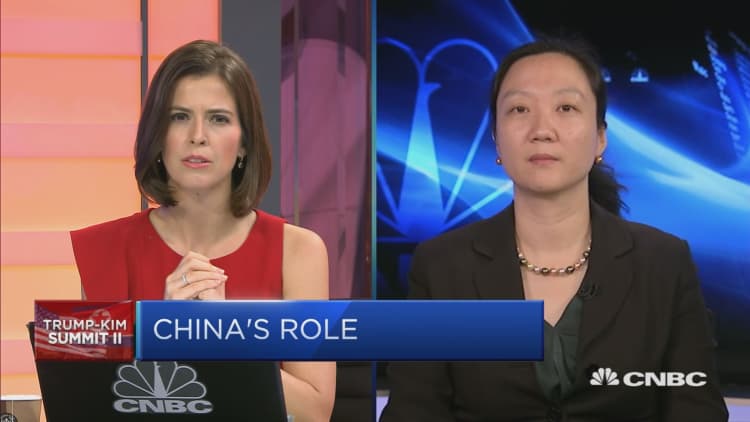
China supports the reunification of North and South Korea, but Beijing is deeply worried about Seoul's security alliance with the U.S., according to one analyst.
Although North and South Korea are still far away from any sort of reunification, both nations have said that remains an ultimate goal. Such a move is hardly on the table for this week's summit between U.S. President Donald Trump and North Korean leader Kim Jong Un in the Vietnamese capital of Hanoi. Still, any draw down in tensions would be a step toward reunification.
China's opinion on North Korea's affairs is important because Beijing is the primary economic and political benefactor of Pyongyang.
"The Chinese have always argued that they actually support the reunification of the Korean Peninsula because when they look at their own case (of) the Taiwan Straits and the reunification that China is trying to achieve, to obstruct the reunification of the Korean Peninsula is almost morally unacceptable and is morally wrong for China to take that position," Yun Sun, director of the China program at Washington think tank the Stimson Center, said Wednesday.
"What the Chinese have always conveyed to the Americans and to the South Koreans is that 'we don't have problems with the reunification, but we have concerns about the future of the U.S.-South Korea alliance,'" Sun added.
Should some form of inter-Korean reunion eventually happen, the big concerns for China would be: "Does the alliance still exist? Will the U.S. have troops basically going north to the Chinese border?" Sun told CNBC.
Beijing will want answers from the U.S. and South Korea on that front, she added.
U.S. troops have been stationed in South Korea since the 1950s. There were more than 26,000 American military personnel in the country at the end of 2018, according to data from the U.S. Defense Department.
"Without an acceptable arrangement or a grand bargain, if you will, on that front, I don't think China will be particularly supportive of reunification," Sun said.
Sun's comments come on the back of reports that the United States and North Korea could agree to declare the end of the 1950-1953 Korean War during this week's summit.
Officially, Beijing said it was "pleased" with dialogue taking place between the U.S. and China.
"China's proposition on the Korean Peninsula issue mainly comprises two aspects: first, to realize the denuclearization of the Korean Peninsula; second, to achieve and maintain the lasting peace and stability on the Peninsula and then in Northeast Asia," Lu Kang, a spokesman at the Chinese foreign ministry, said at a scheduled press conference on Tuesday.
Beijing is "pleased to see that the situation is developing in the direction that China has advocated and hoped for. This is the role that China has always played, and we will continue to play such a role," Lu said.
Importantly, the near-term removal of North Korea's nuclear arsenal appears to have slid off the agenda, as Trump said earlier this month he was "in no rush" on the matter.
That will sit well with Beijing, which prefers a "gradual, incremental and slow process" in the denuclearization of the reclusive North, said Sun, as that will be a "manageable process" for China.
The world's second-largest economy has long said it supports a nuclear-free peninsula, but strategists say its greatest priority is preventing a North Korean regime collapse — if the rogue state falls under the weight of sanctions, that could send a flood of citizens to China.
On the other hand, ending the U.S. military presence in South Korea — a major requirement from Kim's administration before it would relinquish nuclear weapons — would boost China's goal of minimizing America's influence in Asia.
—Nyshka Chandran and CNBC's Weizhen Tan contributed to this report.

